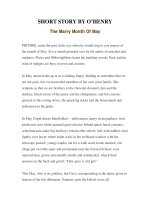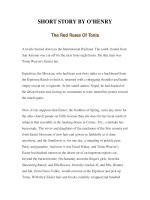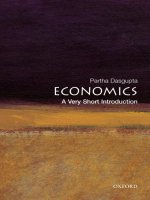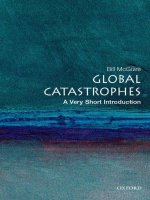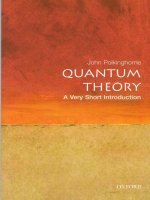Sociolinguistics: A Very Short Introduction
Bạn đang xem bản rút gọn của tài liệu. Xem và tải ngay bản đầy đủ của tài liệu tại đây (1.22 MB, 98 trang )
OxfordUniversityPressisadepartmentoftheUniversityofOxford.
ItfurtherstheUniversity’sobjectiveofexcellenceinresearch,
scholarship,andeducationbypublishingworldwide.
OxfordNewYork
AucklandCapeTownDaresSalaamHongKongKarachi
KualaLumpurMadridMelbourneMexicoCityNairobi
NewDelhiShanghaiTaipeiToronto
Withofficesin
ArgentinaAustriaBrazilChileCzechRepublicFranceGreece
GuatemalaHungaryItalyJapanPolandPortugalSingapore
SouthKoreaSwitzerlandThailandTurkeyUkraineVietnam
OxfordisaregisteredtrademarkofOxfordUniversityPress
intheUKandcertainothercountries.
PublishedintheUnitedStatesofAmericaby
OxfordUniversityPress
198MadisonAvenue,NewYork,NY10016
©OxfordUniversityPress2013
Allrightsreserved.Nopartofthispublicationmaybereproduced,
storedinaretrievalsystem,ortransmitted,inanyformorbyanymeans,
withoutthepriorpermissioninwritingofOxfordUniversityPress,or
asexpresslypermittedbylaw,bylicense,orundertermsagreedwiththe
appropriatereproductionrightsorganization.Inquiriesconcerning
reproductionoutsidethescopeoftheaboveshouldbesenttothe
RightsDepartment,OxfordUniversityPress,attheaddressabove.
Youmustnotcirculatethisworkinanyotherform,and
youmustimposethesameconditiononanyacquirer.
LibraryofCongressCataloging-in-PublicationData
hasbeenappliedfor
978-0-19-985861-3
135798642
PrintedinGreatBritain
byAshfordColourPressLtd.,Gosport,Hants.
onacid-freepaper
Sociolinguistics:AVeryShortIntroduction
VeryShortIntroductionsavailablenow:
ADVERTISING•WinstonFletcher
AFRICANHISTORY•JohnParkerandRichardRathbone
AGNOSTICISM•RobinLePoidevin
AMERICANPOLITICALPARTIESANDELECTIONS•L.SandyMaisel
THEAMERICANPRESIDENCY•CharlesO.Jones
ANARCHISM•ColinWard
ANCIENTEGYPT•IanShaw
ANCIENTPHILOSOPHY•JuliaAnnas
ANCIENTWARFARE•HarrySidebottom
ANGLICANISM•MarkChapman
THEANGLO-SAXONAGE•JohnBlair
ANIMALRIGHTS•DavidDeGrazia
ANTISEMITISM•StevenBeller
THEAPOCRYPHALGOSPELS•PaulFoster
ARCHAEOLOGY•PaulBahn
ARCHITECTURE•AndrewBallantyne
ARISTOCRACY•WilliamDoyle
ARISTOTLE•JonathanBarnes
ARTHISTORY•DanaArnold
ARTTHEORY•CynthiaFreeland
ATHEISM•JulianBaggini
AUGUSTINE•HenryChadwick
AUTISM•UtaFrith
BARTHES•JonathanCuller
BESTSELLERS•JohnSutherland
THEBIBLE•JohnRiches
BIBLICALARCHEOLOGY•EricH.Cline
BIOGRAPHY•HermioneLee
THEBOOKOFMORMON•TerrylGivens
THEBRAIN•MichaelO’Shea
BRITISHPOLITICS•AnthonyWright
BUDDHA•MichaelCarrithers
BUDDHISM•DamienKeown
BUDDHISTETHICS•DamienKeown
CAPITALISM•JamesFulcher
CATHOLICISM•GeraldO’Collins
THECELTS•BarryCunliffe
CHAOS•LeonardSmith
CHOICETHEORY•MichaelAllingham
CHRISTIANART•BethWilliamson
CHRISTIANETHICS•D.StephenLong
CHRISTIANITY•LindaWoodhead
CITIZENSHIP•RichardBellamy
CLASSICALMYTHOLOGY•HelenMorales
CLASSICS•MaryBeardandJohnHenderson
CLAUSEWITZ•MichaelHoward
THECOLDWAR•RobertMcMahon
COMMUNISM•LeslieHolmes
CONSCIOUSNESS•SusanBlackmore
CONTEMPORARYART•JulianStallabrass
CONTINENTALPHILOSOPHY•SimonCritchley
COSMOLOGY•PeterColes
THECRUSADES•ChristopherTyerman
CRYPTOGRAPHY•FredPiperandSeanMurphy
DADAANDSURREALISM•DavidHopkins
DARWIN•JonathanHoward
THEDEADSEASCROLLS•TimothyLim
DEMOCRACY•BernardCrick
DESCARTES•TomSorell
DESERTS•NickMiddleton
DESIGN•JohnHeskett
DINOSAURS•DavidNorman
DIPLOMACY•JosephM.Siracusa
DOCUMENTARYFILM•PatriciaAufderheide
DREAMING•J.AllanHobson
DRUGS•LeslieIversen
DRUIDS•BarryCunliffe
THEEARTH•MartinRedfern
ECONOMICS•ParthaDasgupta
EGYPTIANMYTH•GeraldinePinch
EIGHTEENTH-CENTURYBRITAIN•PaulLangford
THEELEMENTS•PhilipBall
EMOTION•DylanEvans
EMPIRE•StephenHowe
ENGELS•TerrellCarver
ENGLISHLITERATURE•JonathanBate
EPIDEMIOLOGY•RoldolfoSaracci
ETHICS•SimonBlackburn
THEEUROPEANUNION•JohnPinderandSimonUsherwood
EVOLUTION•BrianandDeborahCharlesworth
EXISTENTIALISM•ThomasFlynn
FASCISM•KevinPassmore
FASHION•RebeccaArnold
FEMINISM•MargaretWalters
FILMMUSIC•KathrynKalinak
THEFIRSTWORLDWAR•MichaelHoward
FORENSICPSYCHOLOGY•DavidCanter
FORENSICSCIENCE•JimFraser
FOSSILS•KeithThomson
FOUCAULT•GaryGutting
FREESPEECH•NigelWarburton
FREEWILL•ThomasPink
FRENCHLITERATURE•JohnD.Lyons
THEFRENCHREVOLUTION•WilliamDoyle
FREUD•AnthonyStorr
FUNDAMENTALISM•MaliseRuthven
GALAXIES•JohnGribbin
GALILEO•StillmanDrake
GAMETHEORY•KenBinmore
GANDHI•BhikhuParekh
GEOGRAPHY•JohnMatthewsandDavidHerbert
GEOPOLITICS•KlausDodds
GERMANLITERATURE•NicholasBoyle
GERMANPHILOSOPHY•AndrewBowie
GLOBALCATASTROPHES•BillMcGuire
GLOBALWARMING•MarkMaslin
GLOBALIZATION•ManfredSteger
THEGREATDEPRESSIONANDTHENEWDEAL•EricRauchway
HABERMAS•JamesGordonFinlayson
HEGEL•PeterSinger
HEIDEGGER•MichaelInwood
HIEROGLYPHS•PenelopeWilson
HINDUISM•KimKnott
HISTORY•JohnH.Arnold
THEHISTORYOFASTRONOMY•MichaelHoskin
THEHISTORYOFLIFE•MichaelBenton
THEHISTORYOFMEDICINE•WilliamBynum
THEHISTORYOFTIME•LeofrancHolford-Strevens
HIV/AIDS•AlanWhiteside
HOBBES•RichardTuck
HUMANEVOLUTION•BernardWood
HUMANRIGHTS•AndrewClapham
HUME•A.J.Ayer
IDEOLOGY•MichaelFreeden
INDIANPHILOSOPHY•SueHamilton
INFORMATION•LucianoFloridi
INNOVATION•MarkDodgsonandDavidGann
INTELLIGENCE•IanJ.Deary
INTERNATIONALMIGRATION•KhalidKoser
INTERNATIONALRELATIONS•PaulWilkinson
ISLAM•MaliseRuthven
ISLAMICHISTORY•AdamSilverstein
JOURNALISM•IanHargreaves
JUDAISM•NormanSolomon
JUNG•AnthonyStevens
KABBALAH•JosephDan
KAFKA•RitchieRobertson
KANT•RogerScruton
KEYNES•RobertSkidelsky
KIERKEGAARD•PatrickGardiner
THEKORAN•MichaelCook
LANDSCAPESANDCEOMORPHOLOGY•AndrewGoudieandHeatherViles
LAW•RaymondWacks
THELAWSOFTHERMODYNAMICS•PeterAtkins
LEADERSHIP•KethGrint
LINCOLN•AllenC.Guelzo
LINGUISTICS•PeterMatthews
LITERARYTHEORY•JonathanCuller
LOCKE•JohnDunn
LOGIC•GrahamPriest
MACHIAVELLI•QuentinSkinner
MARTINLUTHER•ScottH.Hendrix
THEMARQUISDESADE•JohnPhillips
MARX•PeterSinger
MATHEMATICS•TimothyGowers
THEMEANINGOFLIFE•TerryEagleton
MEDICALETHICS•TonyHope
MEDIEVALBRITAIN•JohnGillinghamandRalphA.Griffiths
MEMORY•JonathanK.Foster
MICHAELFARADAY•FrankA.J.L.James
MODERNART•DavidCottington
MODERNCHINA•RanaMitter
MODERNIRELAND•SeniaPaseta
MODERNJAPAN•ChristopherGoto-Jones
MODERNISM•ChristopherButler
MOLECULES•PhilipBall
MORMONISM•RichardLymanBushman
MUSIC•NicholasCook
MYTH•RobertA.Segal
NATIONALISM•StevenGrosby
NELSONMANDELA•EllekeBoehmer
NEOLIBERALISM•ManfredStegerandRaviRoy
THENEWTESTAMENT•LukeTimothyJohnson
THENEWTESTAMENTASLITERATURE•KyleKeefer
NEWTON•RobertIliffe
NIETZSCHE•MichaelTanner
NINETEENTH-CENTURYBRITAIN•ChristopherHarvieandH.C.G.Matthew
THENORMANCONQUEST•GeorgeGarnett
NORTHERNIRELAND•MarcMulholland
NOTHING•FrankClose
NUCLEARWEAPONS•JosephM.Siracusa
THEOLDTESTAMENT•MichaelD.Coogan
PARTICLEPHYSICS•FrankClose
PAUL•E.P.Sanders
PENTECOSTALISM•WilliamK.Kay
PHILOSOPHY•EdwardCraig
PHILOSOPHYOFLAW•RaymondWacks
PHILOSOPHYOFSCIENCE•SamirOkasha
PHOTOGRAPHY•SteveEdwards
PLANETS•DavidA.Rothery
PLATO•JuliaAnnas
POLITICALPHILOSOPHY•DavidMiller
POLITICS•KennethMinogue
POSTCOLONIALISM•RobertYoung
POSTMODERNISM•ChristopherButler
POSTSTRUCTURALISM•CatherineBelsey
PREHISTORY•ChrisGosden
PRESOCRATICPHILOSOPHY•CatherineOsborne
PRIVACY•RaymondWacks
PROGRESSIVISM•WalterNugent
PSYCHIATRY•TomBurns
PSYCHOLOGY•GillianButlerandFredaMcManus
PURITANISM•FrancisJ.Bremer
THEQUAKERS•PinkDandelion
QUANTUMTHEORY•JohnPolkinghorne
RACISM•AliRattansi
THEREAGANREVOLUTION•GilTroy
THEREFORMATION•PeterMarshall
RELATIVITY•RussellStannard
RELIGIONINAMERICA•TimothyBeal
THERENAISSANCE•JerryBrotton
RENAISSANCEART•GeraldineA.Johnson
ROMANBRITAIN•PeterSalway
THEROMANEMPIRE•ChristopherKelly
ROMANTICISM•MichaelFerber
ROUSSEAU•RobertWokler
RUSSELL•A.C.Grayling
RUSSIANLITERATURE•CatrionaKelly
THERUSSIANREVOLUTION•S.A.Smith
SCHIZOPHRENIA•ChrisFrithandEveJohnstone
SCHOPENHAUER•ChristopherJanaway
SCIENCEANDRELIGION•ThomasDixon
SCOTLAND•RabHouston
SEXUALITY•VéroniqueMottier
SHAKESPEARE•GermaineGreer
SIKHISM•EleanorNesbitt
SOCIALANDCULTURALANTHROPOLOGY•JohnMonaghanandPeterJust
SOCIALISM•MichaelNewman
SOCIOLOGY•SteveBruce
SOCRATES•C.C.W.Taylor
THESOVIETUNION•StephenLovell
THESPANISHCIVILWAR•HelenGraham
SPANISHLITERATURE•JoLabanyi
SPINOZA•RogerScruton
STATISTICS•DavidJ.Hand
STUARTBRITAIN•JohnMorrill
SUPERCONDUCTIVITY•StephenBlundell
TERRORISM•CharlesTownshend
THEOLOGY•DavidF.Ford
THOMASAQUINAS•FergusKerr
TOCQUEVILLE•HarveyC.Mansfield
TRAGEDY•AdrianPoole
THETUDORS•JohnGuy
TWENTIETH-CENTURYBRITAIN•KennethO.Morgan
THEUNITEDNATIONS•JussiM.Hanhimäki
THEU.S.CONCRESS•DonaldA.Ritchie
UTOPIANISM•LymanTowerSargent
THEVIKINGS•JulianRichards
WITCHCRAFT•MalcolmGaskill
WITTGENSTEIN•A.C.Grayling
WORLDMUSIC•PhilipBohlman
THEWORLDTRADEORGANIZATION•AmritaNarlikar
WRITINGANDSCRIPT•AndrewRobinson
Availablesoon:
MANAGEMENT•JohnHendry
FOOD•JohnKrebs
FRACTALS•KennethFalconer
INTERNATIONALSECURITY•ChristopherS.Browning
ENTREPRENEURSHIP•PaulWestheadandMikeWright
VERYSHORTINTRODUCTIONS
VERYSHORTINTRODUCTIONSareforanyonewantingastimulatingandaccessiblewayintoanew
subject.Theyarewrittenbyexperts,andhavebeenpublishedinmorethan25languagesworldwide.
Theseriesbeganin1995,andnowrepresentsawidevarietyoftopicsinhistory,philosophy,religion,
science,andthehumanities.TheVSIlibrarynowcontainsmorethan300volumes—aVeryShort
IntroductiontoeverythingfromancientEgyptandIndianphilosophytoconceptualartandcosmology
—andwillcontinuetogrowinavarietyofdisciplines.
VERYSHORTINTRODUCTIONSAVAILABLENOW
Formoreinformationvisitourwebsitewww.oup.com/vsi/
JohnEdwards
SOCIOLINGUISTICS
AVeryShortIntroduction
DoDorrenagusd’OisínÓSiochrú,
beirtabhfuilgrámóragus
cionagamdóibh
Contents
Listofillustrations
Acknowledgments
1Comingtoterms
2Variationandchange
3Perceptionsoflanguage
4Protectinglanguage
5Languagesgreatandsmall
6Loyalty,maintenance,shift,loss,andrevival
7Multilingualism
8Name,sex,andreligion
References
Index
Listofillustrations
1JabberwockbySirJohnTenniel
InLewisCarroll,ThroughtheLooking-Glass,andWhatAliceFoundThere,London:Macmillan,
1871,20.
2TheIndo-Europeanfamilytree
JohnEdwards
3PoorLetterH:ItsUseandAbuse
CourtesyoftheBodleianLibrary
4TheAcadémiefrançaise
PhotographbyTristanNitot
5EliezerBen-Yehuda,Hebrewlanguagerevivalist
Designer,ZviNarkiss;bycourtesyoftheIsraelPhilatelicService,IsraelPostalCompany
6SirJamesMurray,firsteditoroftheOxfordEnglishDictionary
BypermissionofTheSecretarytotheDelegatesofOxfordUniversityPress
Acknowledgments
WhileIhavedrawnontheworkofmanycolleagueshere,directhelpwasprovidedbyPaulinDjité,
TadhgÓhIfearnáin,GenevaSmitherman,andRobertZecker.
Chapter1
Comingtoterms
Theacquisitionoflanguagecannotbeaccountedforsolelyonthebasisofpostnatalexperience.Human
beingsmustbegeneticallypreparedor“pre-wired”tolearnlanguage.Sinceitwouldbesillytothinkthat
childrenborninFrancehaveadifferentsortofevolutionarywiringthantheircounterpartsinFinland,
brainsmustbeequally“ready”inallthemanylanguagecommunitiesoftheworld.This,inturn,implies
thatatsomefundamentallevelalllanguagesmaybecutfromthesamecloth.NoamChomskyhasbeenthe
singlemostimportantchampionofthisapproach,inwhichlinguisticsintertwineswithphilosophy,
psychology,andepistemology.Alllanguagesarenot,ofcourse,similaratmoreimmediatelyobservable
levels,whichmeansthatlinguistsalsoconcernthemselveswiththestructureofwords(morphology)or
phrases(syntax),withmeaning(semantics),withsound(phonology),andwithlexicon(vocabulary).In
effect,theirworkamountstoadetailedfleshing-outoftheenvironmental“shaping”thatdirectsthe
generalgeneticpreparednessintospecificlanguagechannels.
Theenvironmentalcontextsoflanguageareitsobviousandimmediatefacets,andwhatmightbecalled
the“sociallifeoflanguage”hasalwaysbeenofgreatinteresttoawidevarietyofpeople.Centralhereis
therelationshipbetweenlanguageandidentity,whoseconsequencesarealwaysinterestingandsometimes
dramatic.Athousandyearsbeforethedawnofthemodernera,someEphraimitesattemptedto“pass”as
Gileadites:theyhadbeendefeatedandhopedtoreturnhomeacrosstheJordan.Theyweredetected,
however,becauseoftheirinabilitywhenchallengedtopronouncethewordshibbolethintheGileadite
manner.InJudges12:6,whentheimpostor“couldnotframetopronounceitright…theytookhim,and
slewhimatthepassagesofJordan”(KJV).Moregenerally,andmorepeacefully,PubliliusSyrus—oncea
slave,thenafamousRomanepigrammatist—observedthat“speechisamirrorofthesoul.”Inthe
seventeenthcentury,JohnLockewrotethatlanguageisthe“greatinstrumentandcommontie”ofsociety.
And,inthetwentieth,thelinguistEdwardSapirarguedthatlanguagewassimplythemostbasiclinchpin
ofhumanity.Inbothitsordinarycommunicativeroleandasthemostimmediatesymbolicmarkerofhuman
affiliation,languageispreeminentlyasocialphenomenon.
Scholarlyinquiryintosociolinguisticsandthesociologyoflanguagecanbetracedtothenineteenth
century,andnodoubtexistedmuchearlier.Thetermsusedtoday,though,arerelativelyrecent.Japanese
scholarsinthe1930shadproposedtheunitingofsociologyandlinguistics,andthewordsociolinguistics
wasapparentlyintroducedbyaCambridgeanthropologist,ThomasHodson,in1939.Thesinglemost
importantantecedenttomodernstudy,however,appearedin1952.
Inthatyear,anassistantprofessorofEnglishinHoustoncitedH.L.Mencken’sTheAmericanLanguage,
suggestingthatitsgreatpopularitydidnotindicateabroadpublicconcernwithlanguageorlinguisticsper
sebut,rather,thatitwas“sociallysatisfyingorharrassing”tomanypeople.HaverCurriewasableto
pointtosomeexistingAmericanacademicattentiontothosesocialaspectsoflanguagethatinterested
Mencken’sreaders,buthelamentedthattheUnitedStateslaggedbehindEuropeinthestudyof“folk”or
“common”speech.UnawareofHodson’scoinage,Curriethensuggestedthatascholarlyfieldcalled
socio-linguistics[sic]mightusefullybededicatedtotheinteractionoflanguageandsociety.
Curriementionedsocialstatusasaparticularlyinterestingvariable,foreshadowingagreatamountof
workinareasrangingfromminority-majoritygrouprelations,tothewaysinwhichdifferentdialectsare
perceived,tothelanguageofkinshiptermsandpoliteness.If,forexample,languagesanddialectscan
havegreaterorlesserprestigeaccordingtothestandingoftheirspeakers,itisequallyclearthat
individualsmaybegivendifferenttitles(Dr.,Mr.,Ms.)andcanbeaddressedatdifferentlevelsof
formality(John,ProfessorSmith).Formalityisreflectedindifferentpersonalpronouns:thus,tuorvous
inFrench;duorSieinGerman;túorustedinSpanish.Englishhaslostitsearlierthou–youdistinction,
butitdoesretainthe“royalwe,”thepluralformusedofanindividual,historicallyrelatedtopower,and
oftenthebasisofthe“respectful”variantofthesecond-personpronoun.
Thesociologyandthesocialpsychologyoflanguageare,likesociolinguistics,concernedwiththe
intertwiningoflanguageandsociety.Somehavesuggestedthatwhilethemainfocusofsociolinguisticsis
onlanguagevariationindifferentsocialcontexts,theothertermsimplyanemphasisonbehaviorand
contextfromalinguisticperspective.Othershavearguedthatsociolinguisticsisessentiallythestudyof
speakers’languagechoices;ifso,areciprocityofinfluencebecomesimmediatelyapparent.Context
clearlyaffectssuchchoices:wemakedifferentselectionsfromourrepertoirewhentalkingtospouses,
children,pets,vicars,doctors,friendsinthebar,andsoon.Atthesametime,however,language
variationcanbeanimportantindicatorofspeakers’perceptionsofparticularsettingsandsomayevenact
toaltertheirpsychosocialtenor.Afurtherdistinctionhasseensociolinguisticsmoreinterestedinmatters
atamicrolevelthanatabroadermacroone.
Notonlyaretermsanddistinctionsheretreatedquiteloosely(sometimeswithinthesameinquiry),there
areothermorespecificheadingsunderwhichthelanguage-and-societynexusisstudied.Includedare
appliedlinguistics,educationallinguistics,anthropologicallinguistics,geolinguistics,and
ethnolinguistics.Thesemorefine-grainedheadingsandperspectivesareemployedaccordingtocontext
and,often,tointent.Itisprobablynotveryfruitfultoattemptfurtherdelineationsalongtheselines,
probablybesttosimplyrecognizethatbeyondthescopeoflinguisticsperse,thereisarelatedbutoften
fairlyindependentsetofapproachesthatconsidersocietyandlanguagetogether.
Fourfinalnotes.First,althoughthisisnotastudyofhistoricalsociolinguistics,readerswillnotefrequent
historicalallusionsandexamples.Theyareheretoremindusthatlongbeforethemoderntermsnowin
familiaruse,peoplewerealwaysdeeplyconcernedaboutthesociallifeoflanguage.Second,when
discussinglanguagesandlanguagegroups,Ihavenotputwordslikesmall,big,andlargeinthequotation
marksthattheyreallyrequire.Thetermsdenotetherelativescopeanddominanceoflanguages,notthe
actualsizeofspeechcommunities.Moreimportantly,novaluejudgmentisimplied.Third,
multilingualismcouldoftenreplacebilingualismhere(inconsideringfluencyacrossdifferent
dimensions,forinstance);theuseofthelattertermaloneissimplyintheinterestsofbrevityand
nonrepetition.Fourth,representationoflettersandpronunciationsdepartsfromtechnicalconvention—
this,simplyintheserviceofgreaterreader-friendliness.
Language,dialect,andaccent
Ithasbecomefashionableinsomeacademicquarterstodenythatlanguagesactuallyexist,atleastas
“separableandenumerablecategories.”Languagesaresocialconstructionsorinventionsthatvaryacross
bothcommunitiesandindividuals.Thereareoverlaps,sharpboundariesaregenerallylacking,and
repertoiresaredynamicandnotunchanging.Indeed,attheleveloftheidiolect—thelanguageofthe
individual—notwoofusareexactlyalike.Nonetheless,forallordinaryintentsandpurposes,thereare
separatelanguages,andtherearedistinctvarietieswithinthem.
Thereareinterestingdebatesaboutnonhumansystemsofcommunication.Isitrighttospeakofthe
“language”ofsomeprimates,ofbees,porpoises,andwhales,orshouldthelabelonlybeappliedto
humanbeings?Whateverthepreferredanswer,noonewoulddenythathumanlanguageisfarandaway
themostcomplexofallmediums.Itdoesnot,asothernonhumansystemsdo,merelyreflectinstinctualand
largelyinvariantresponsestoimmediatestimuli.Onthecontrary,wecandiscusseventsinboththepast
andthefuture,wecancontemplatethingsthatneverexistedandneverwill.Thisnuanceispossible
becauseallmembersofalanguagecommunityagree,firstofall,onthemeaningsofthingsthatreflect,in
themselves,arbitrarychoices.Thereisnothingintrinsicineitherthesound“table,”oritsrepresentation
onthepage,thatconjuresupthefamiliarmeaning.It“works”inEnglishbutnotinGermanorJapanese,
wherethecommunityhascometoassigndifferentsoundsandsymbolstothatsameconcept.
Second,wecollectivelyagreeuponcertainrules—thegrammarofalanguage—whichare,again,entirely
arbitrary.Withasetofelements(wordsorcomponentsofwords)andasystemthatregulatestheir
combinations,thereemergesalanguagecapableofmoreorlessinfinitecreativity.Withalittlethought,it
wouldbepossibleforalmostallofustocomeupwithasentencethathasprobablyneverbeenutteredor
writtenbefore;areasonableknowledgeofelements-plus-rulesshouldpermitthedecipheringofits
meaning.Thisknowledgealsoallowsustoseparatesentencesthatarenonsensicalbutgrammatical
(“Colorlessgreenideassleepfuriously”)fromthosethatarebothnonsensicalandungrammatical
(“Furiouslysleepideasgreencolorless”).Note,too,thatwhat“works”asnonsensical-but-grammatical
inonelanguagewillnotdosoinanother.“’Twasbrilligandtheslithytoves”isEnglishnonsense,and
Jabberwockywouldhavetobedramaticallyrecast—ashasbeendone—toturnitintoeitherDas
JammerwochorLeJaseroque.
1.SirJohnTennieldrewthisillustrationforLewisCarroll’sThroughtheLooking-Glass,andWhat
AliceFoundThere(1871).ItshowsthemonsterdescribedinCarroll’sfamousnonsensepoem
Jabberwocky.
Allofthissuggestsapowerfulbutdelicatehumanlanguagecapacity.Foralongtime,observersasvaried
asLudwigWittgenstein(philosopher),OttoJespersen(linguist),andCharles-MauricedeTalleyrand
(politician)havepointedoutthatthecentralcharacteristicoflanguageisthecapacityforstorytelling,for
hidingratherthanrevealing,forfictionandfalsehood.
Mostlanguageshaveanumberofrelatives,sharingsomecommonfamilialfeatures.However,even
speakersofcloselyrelatedvarieties—SpanishandItalian,forinstance—cannotexpectfullmutual
comprehension,andreciprocalunintelligibilityclearlyincreaseswithlinguisticdistance.Indeed,one
wouldexpectnooverlappingbetweenFinnishandHaida.Assubvarietiesunderacommonlanguageroof,
dialectsareformallydefinedasmutuallyintelligiblevariants,differingonefromanotheralongthree
dimensions:vocabulary,grammar,andpronunciation.InsomeEnglishdialects,speakersbrewtheirtea;
othersletitmash,orsit,orsteep.Inothers,frying-pansbecomeskillets,andmilkshakesbecome
frappesorperhapsevencabinets.Fewwoulddenythattheselexicalvariantsareanythingotherthan
differentfromoneanotherorwouldassertthatbonnetisbetterthanhood,thatbootmakesmoresense
thantrunk,thattubeismoreappropriatethansubway.(SimpletranslationbetweenBritishandAmerican
variantsdoesnotexhaustthecomplexity,ofcourse.LiketheAmericans,theBritishhavetrunks,butnoton
theircars;theircarshavehoods,whicharenottheirbonnets;andAmericanswithoutcarscantravelon
thesubway,somethingthattheEnglishcanonlywalkthrough.)
Whenitcomestogrammaticalvariation,however,manypeopleareratherlesstolerant:when,for
instance,theyhearsomeonesay,“Idoneityesterday,”or“Iain’tnevergoin’thereagain,”or“IaxBilly
canheplaytomorrow.”Thereisinfactamplescholarlyevidencethatalldialectsarevalidsystemsof
communication,andthatnoneisintrinsicallybetterorworsethananother.Itislogicaltoassumethat
everygroupofspeakershasacommunicationsystemthatworksforthemwiththeprecisioncalledforin
theirsocialcircumstancesandwithoutambiguity.Itisillogicaltothinkthatsomegroupsmanagetogetby
withoutsuchasystem.Speakersofalldialects,then,speakcorrectly.Theonlyappropriateyardsticksof
correctnessarecommunitynorms.Problemsarisebecausenotallcommunitiesanddialectshaveequal
socialclout,becausethelinguisticstandardsofthoseinpowerbecomedominant,andbecausesocial
dominance(inlanguageaselsewhere)allowsdifferencetobetranslatedintodeficiency.
Afinalwordhereaboutdialectsandtheirpresumedmutualintelligibility.TheinhabitantsofTangier
IslandinChesapeakeBaycertainlyspeakEnglish,buttheirdialectisvirtuallyimpenetrableformainland
Americanspeakers.Ontheothersideoftheocean,apopularEnglishtelevisionprogram,Auf
Wiedersehen,Pet,depictedtheadventuresofagangofunemployedbricklayers,oneortwoofwhomhad
suchthickGeordievarieties—theworking-classdialectofNewcastle-upon-Tyne—thatlettersinthe
newspaperfromviewersinthesouthofEnglandrequestedsubtitles.Indeed,mostofushaveencountered
varietiesofourownlanguagethatfailthemutual-intelligibilitytest.
RobertBurnsfamouslywroteinScots—alsoknownas“braid[broad]Scots,”or“Lallans[Lowlands]
Scots”;hereisaversefromhisfamiliarAuldLangSyne,writtenin1788andsungaroundtheworldon
NewYear’sEve(orHogmanay,inScots):
Wetwahaerunaboutthebraes;
Andpu’dthegowansfine;
Butwe’vewander’dmonyawearyfit,
Sin’auldlangsyne.
AcoupleofcenturiesafterBurns,IvisitedEdinburghandwenttoSuruchi—anIndianrestaurant—where
themenuopenedwiththesewords:
We’regaunaewheechyeaffforawhilie—afftaeyerainpairtoIndia,whaurye’lleatthaedishesthatmaistfowkinIndiaeats.
ThoBritainishoatchinwi“curryshops”theday,inScotlandwe’reskiffinthesurfaceyet…
Amongthefoodonoffer:popadoms(plainyinsorspicyyins);murghsagwala(tenderdaudsochucken
cookitwireamedspinach,ingans,greenherbsanguidreekinspices);andchuckentikkamasala(thehail
jingbangofowkinBritainloothisdishannooit’scookittaetheSuruchi’suniquereceipt).Readersmay
reasonablyaskifguidbraidScotsisanEnglishdialectoraseparatelanguage.
Finally,supposethattherearefourdialectcommunities,A,B,C,andD.SupposethatspeakersofAand
Bcaneasilyunderstandoneanother,thatthoseingroupsAandChavesomeconsiderabledifficulty,and
thatspeakersofAandDsimplycannotcommunicate.DoesthismeanthatAandDareactuallydifferent
languages?ThoseunawareofgroupsBandCmightbeforgivenforthinkingso,buttheymightnotifthe
fullcontinuumwererevealedtothem.ThesuggestionmadebythelinguistandYiddishistMaxWeinreich
that“alanguageisadialectthathasanarmyandnavy”illustratesanotherpointofconfusionbetween
languagesanddialects.SpeakersofNorwegianandDanishcanunderstandeachotherwell—Swedish
mightgointothemix,aswell—butthedemandsofpoliticalidentityrequirethattheirvarietiesarestyled
languages.AsimilarsituationappliestoHindiandUrdu,toCzechandSlovak,andtootherpairsand
triplets.
ThestoryofSerbo-Croatianisaratherpoignantexampleofsocialinterferenceinthenameofidentity.
ThelanguagewasacommonvarietyamongnotjustSerbsandCroatsbutalsoBosniansand
Montenegrins.Therewere,tobesure,internalvariants,pressures,andcomplaints,butthelanguageas
suchwaswidelyusedandaccepted.WiththebreakupofYugoslavia,Serbo-Croatianlostitsofficial
existence,tobereplacedbyBosnian,Serbian,andCroatian.
InSerbialittlehasactuallyhappened;indeed,oneofthoseearliercomplaintswasthatthelanguagewas
too“Serbianized”amediumanyway.InBosnia,movestoemphasizeArabic-Turkishfeatureshavebeen
made,butbasicgrammarandlexiconhavebeenlittleaffected.InCroatia,though,anumberofsymbolic
declarationshavebeenaccompaniedbyformaleffortstotryandmaketwolanguageswhereoneonce
existed.Scholarsarethusemployedtosetupbarrierstocommunicationinthecauseofanexclusionary
groupsolidarity.
Withindialect,therearealsoimportantvariantsandperceptionsatthelevelofaccentorpronunciation,
andsomeotherwithin-languagedistinctions—suchasstyle,register,slang,andjargon—willbetouched
uponlaterinthebook.
Instrumentandsymbol
Thecommunicativefunctionoflanguagesandtheirsubvarietiesdoesnotexhausttheirimportance.
Languagesarealsopotentboundarymarkers,highlightingandlabelingparticularsocialmemberships:
theyaresymbolsofgroupidentity.Thisisnotsomethingpeoplethinkaboutverymuch,perhaps,ifthey
belongtoacommunitywhoselanguageisoneofthecurrent“languagesofwidercommunication”like
English,Spanish,Chinese,andArabic.Forspeakersofthesevarietiesthecommunicativeandthe
symbolicaspectscoincide,andthelanguageofdailylifeisalsothatinwhichthegroup’straditions,
history,andliteraturearerecorded.Thosewhosemothertongueisasmallerlanguage,however,often
findtheiroriginalorancestrallanguagebecomingmoreandmoreasymbolicmedium.Symbolicaspects
oflifecanstillfigureimportantlyinself-perception;infact,theirverylackoftangibleorvisible
substancecangivethemstrengthandstayingpower.Still,althoughpsychologicallyimportantlanguage
statuscanlongremainafterthepartialorfulleclipseofmundaneinstrumentality,symbolicstatusarises
fromordinaryvernacularuse—notthereverse.Ashiftawayfromalanguageinitsordinary
communicativerolemustleadeventuallytothedilutionandultimatedisappearanceofitssymbolic
significance.
Languagefamilies
Howdidhumanlanguagearise?Wasthereoneoriginalvariety(theprincipleofmonogenesis)ordid
severalemergemoreorlesssimultaneously,indifferentplaces(polygenesis)?Puttingthesequestions
togetherwithwhatisknownabouttheworld’sfivethousandlanguages,consideringthattheseare
collectedinasmanyastwoorthreehundredlanguagefamilies,andrealizingthatthesefamiliesare
componentsinstilllargergroupings,makestheideaofsomeoriginallinguistictreetrunk(s)seemlogical,
ifonlytheoreticallysupportable.Harddataevaporateovertime,andevencontemporaryrelationshipsare
notalwaysclear.Wheresomescholarswouldperceiveaseparatefamily,otherswouldseeathickbranch
ofanexistinggroup,andthisaccountsforthewidelyvaryingestimatesoflanguage-familynumbers.
Somemightthinkthatreferencetolanguageclassificationsandfamiliesisofnarrowlinguisticinterest
andnotagreatconcernformore“social”attention.Thisiswrongonbothgeneralandspecificcounts.
Theever-increasingknowledgeaboutsuchgroupingsreliesuponscholarlytriangulation,inwhich
evidencefromlanguagepatternsandsimilaritiesiscombinedwitharchaeological,historical,andgenetic
informationtoproduceaninformativesocialpictureofpastandpresentcommunities.Morespecifically,
chapter8showshowlanguages,andthepossiblerelationshipsamongthem,havehistoricallyloomed
largeinsomeofthedeepestreligiousquestions.
SpeculationaboutfamiliesoflanguageshadbeenabroadformorethanacenturywhenSirWilliam
(“Oriental”)Jonesgavetheideaits“academicidentitycard”ina1784addresstotheAsiatickSocietyof
Bengal,suggestingstrongaffinitiesamongSanskrit,Greek,andLatin.Oneofhisbiographershascalled
Jonesthe“fatherofmodernlinguistics”and,whilethismaybeoverlygenerous,hewasclearlyoneofthe
firstscholarsofcomparativeandhistoricallinguistics.HisdescriptionofLatinandGreekas“sisters”
havingacommon“parent”markedthebeginningofseriousattentiontowhatwouldsoonbecalledthe
“Indo-European”languagesand,morewidely,tocross-languagecomparisonsthatwentbeyondvarieties
ingeographicalproximity.Theworktooksometimetogearup,however,andthenineteenth-century
studiesofJacobGrimm,FranzBopp,RasmusRask,andothercontinentalscholarsprovidedthefirstfirm
bases.AhistoricalapproachtolanguageclassificationwasdistinctlyappealinginDarwin’scentury;so,
aswithearlierlinguisticanaloguestoherbalsandbestiaries,languagefamiliescametobeunderstoodas
productsandreflectionsofevolutionarydevelopment.BeyondtheIndo-Europeangroupoflanguages,
otherimportantassembliesincludetheAustronesian,Niger-Congo,Afro-Asiatic,andSino-Tibetan
families.Thegreatestnumberofspeakers(about2.5billion)isfoundamongthe450Indo-European
languages,buttheNiger-CongoandAustronesianfamilies,eachwithabout350millionspeakers,reveal
muchgreaterlanguagediversity:therearemorethan1,500languagesintheformer,andalmost1,300in
thelatter.
BoxA
SirWilliamJonesonSanskrit,1784
TheSanscritlanguage,whateverbeitsantiquity,isofawonderfulstructure;moreperfectthanthe
Greek;morecopiousthantheLatin,andmoreexquisitelyrefinedthaneither,yetbearingtobothofthem
astrongeraffinity,bothintherootsofverbsandintheformsofgrammar,thancouldpossiblyhavebeen
producedbyaccident;sostrongindeed,thatnophilologercouldexaminethemallthree,without
believingthemtohavesprungfromsomecommonsource,which,perhaps,nolongerexists.
